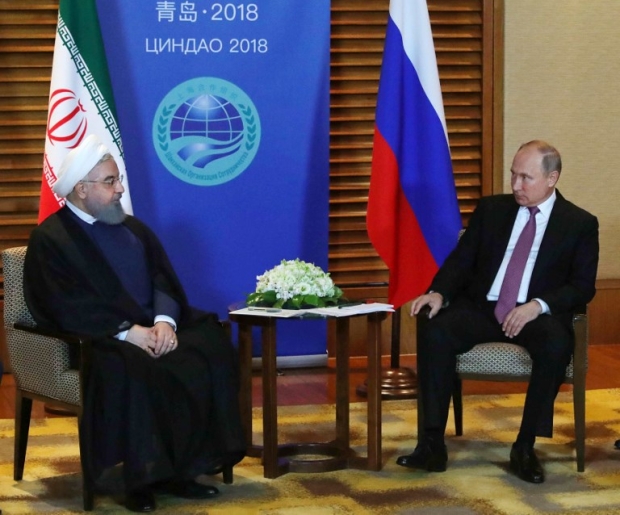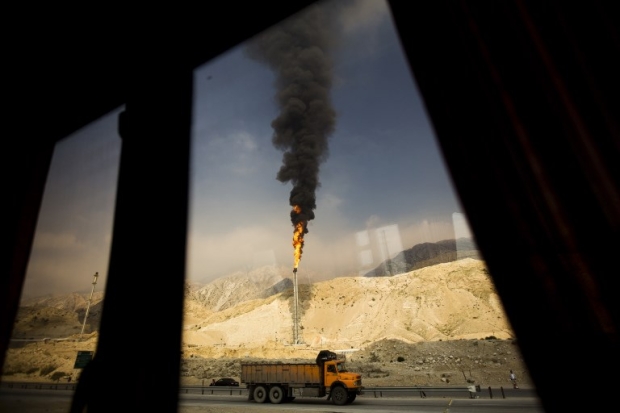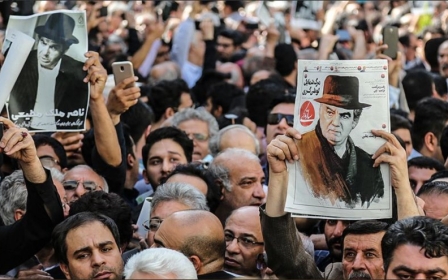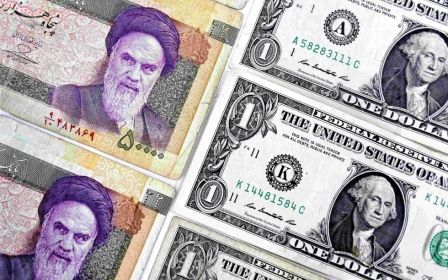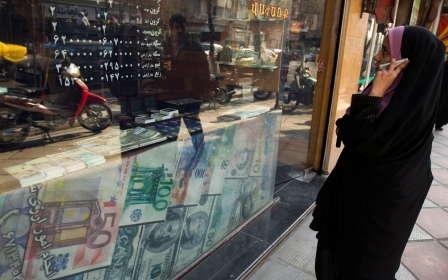ANALYSIS: After US rebuff, Iran forced to hedge bets in the East
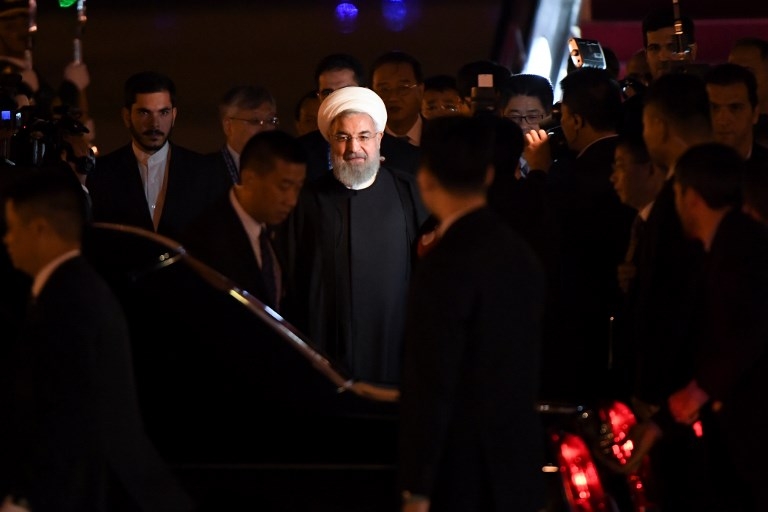
President Hassan Rouhani’s recent trip to China has fuelled speculation that Tehran is turning its back on the West with companies starting to leave Iran as the ramifications of the US withdrawal from the nuclear deal unfold.
Earlier this month, Rouhani told the Shanghai Cooperation Organisation that Iran would like to become a full member of the regional security group, led by China and Russia, and called on its leaders to confront the US.
'Now that the situation is getting difficult, Rouhani has no other choice but to extend his hands to the Eastern countries'
- Nasser Assadi, foreign policy expert
“The US efforts to impose its policies on others are expanding as a threat to all,” he told the leaders at the summit.
During the summit held in the city of Qingdoa in China's eastern Shandong province, Rouhani met with the presidents of Indian and Russia and afterwards at a summit with Chinese President Xi Jinping, the two signed four agreements including one involving Iran’s role in China’s "One Belt, One Road" initiative.
The economic ties between Iran and the East, particularly China, are already strong. According to Iranian officials, the trade volume between Tehran and Beijing reached a record $52bn last year.
New MEE newsletter: Jerusalem Dispatch
Sign up to get the latest insights and analysis on Israel-Palestine, alongside Turkey Unpacked and other MEE newsletters
China and India are already two of the biggest buyers of Iranian crude and are signalling that even with new US sanctions, that won't change.
But while it may seem that Rouhani is pivoting east, analysts say that’s only because his hand has been forced and his manoeuvres are more an attempt to readjust Tehran’s relationships in a post-Trump world.
"Since coming to office, President Rouhani sought to establish good relations with European countries,” Nasser Assadi, a foreign policy expert, told Middle East Eye.
“But now that the situation is getting difficult, he has no other choice but to extend his hands to the eastern countries.”
Going back on promises?
In both the 2013 and 2017 presidential elections, Rouhani won on the promise that he would resolve the nuclear issue and open a new chapter in Iran’s relations with the West.
But with Donald Trump’s victory in 2016 - and the fulfilment of his campaign promise to kill the nuclear deal – the reinvigorated relations between the West and Iran that came with the agreement are now in danger.
Having a strategic view to the East is the easiest thing we can do to get rid of the Western hide-and-seek
- Ali-Akbar Velayati, advisor to Supreme Leader Ali Khameini
And while the Europeans have taken steps to shield EU companies so they can continue doing business in Iran, progress has been slow. New US sanctions slapped on Iran could see European companies face punitive actions and fines.
“The West, namely the US, burnt a golden opportunity,” said Assadi. “Rouhani's first priority has always been having a strategic partnership with Europe and the US, but Trump's decision on [the nuclear deal] and its consequent internal and external effects forced Rouhani to change his path, going to Beijing, Moscow and New Delhi."
Rouhani isn’t ignoring Europe – his trips to Switzerland and Austria scheduled for July are proof. But, say analysts, Iran can’t put all of its eggs into one basket, so it is approaching old friends in the East, particularly China.
Ali-Reza Nourmohammadi, an international relations professor at Tehran’s Aallame Tabataba'i University, told MEE: "Under the current circumstances, as the [nuclear deal] faces failure, Iran is forced to secure its economic needs and oil sales by developing ties with China, Russia and India.”
In particular, Nourmohammadi believes that Tehran is seeking to secure oil sales, which the country's economy relies on, with the three countries.
Even if his hand is forced, Rouhani’s gestures to the East are being welcomed by conservatives who long warned Rouhani and other reformists against trusting the West – and are now pushing Tehran eastwards.
Conservative Ali-Akbar Velayati, international affairs advisor to Supreme Leader Ali Khamenei, in late May said: "Having a strategic view to the East is the easiest thing we can do to get rid of the Western hide-and-seek."
Velayati, who served as Iran’s foreign minister for 16 years in the 1980s and 1990s and has an influential role in Iran's foreign policy, hit out at reformists who have favoured opening to the West.
"We shouldn’t be affected by Westernised figures [in Iran] who like Paris more than Moscow,” he said.
'Iran shouldn’t expect too much from China'
- Rasoul Hosseini, foreign policy expert
Iran, Russia and China, he said, have more common interests than Iran and the West and can work together.
“At the peak of the sanctions' period, China cooperated with us and the volume of our trade with China reached $52bn,” he said. “Years ago, the supreme leader called for pivoting towards the East.”
Alaeddin Boroujerdi, a conservative who chairs the Iranian parliament’s national security and foreign policy commission, said on 24 March: "China and Russia are two important and influential permanent members of the [UN] Security Council, and enhancing the ties will help to make the US pressures less effective or futile."
Curbing expectations
Rouhani's trip to China was an opportunity for him to assess Beijing’s loyalty to Tehran and whether the country will stand behind Iran if tensions flare with the US in the future.
The results, said experts, weren’t crystal clear – and won’t be anytime soon.
The issue is the extent to which they are willing to help Iran hinges on their national interests and relative power.
Rasoul Hosseini, a foreign policy expert, told MEE: "The Chinese government decides based on its own interest and their priority is development and stability, and that is why they paved the way for US and North Korea agreement. Hence, I believe Iran shouldn’t expect too much from China.”
Meanwhile, Nourmohammadi said that China's decision to back Iran is dependent on two factors.
"If we look at trade volumes, we realise that China and Iran's economic relationship is not so much that would make Beijing sacrifice its ties with the US,” said the university professor.
Despite the trade war between China and the US, Nourmohammadi said no one can assume China will go out of its way to help Iran.
"China will support Tehran as long as it is in its interest, therefore we can't view them as a strategic partner," he said.
Middle East Eye delivers independent and unrivalled coverage and analysis of the Middle East, North Africa and beyond. To learn more about republishing this content and the associated fees, please fill out this form. More about MEE can be found here.


